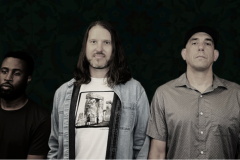Bertram is a band of blended sounds, cities, and life experiences. For the past several years, James Lampe, the band’s primary songwriter, has been busy with the grind of writing and producing. Simultaneously, he has traveled back and forth frequently between Chicago, Illinois and Dayton, Ohio in order to juggle multiple bands, his work, and his personal life. This kind of grind would burn most people out within a few weeks, let alone a few years. In Lampe’s case, it fueled him to become a content creating machine.
Featuring the combined, creative endeavors of Lampe and Michael Evans (keyboard), Betram recently released their debut album You Can’t Get There From Here. The blood, sweat, and tears of Lampe’s hard working lifestyle are present in the bones of the album. These earned, nuanced ingredients inspire Bertram’s authentically Americana and rock and roll flavors. This is further accentuated by Lampe’s ability to tell an incredible story or paint a vivid picture through his lyrics. The formally trained expertise of Evans gives life to additional textures of progressive rock with a remarkably professional finish. The album is full of unexpected twists and turns, emotional ups and downs, but overall provides an uplifting and heartfelt experience for the listener.
Ghettoblaster’s Andrew Humphrey caught up with Lampe to discuss the details of the endeavor.
Bertram covers quite a few different genres, sounds, and moods. How do you describe it?
I describe our music first as being lyrically driven. I think that is a common thread across our music, no matter the genre or mood we are going for. I have a hard time landing on one genre to describe our sound, so I throw a few terms together like folk, pop, Americana, progressive rock, and by the time I’ve said all that people stop trying to picture it in their heads.
There are some tasteful throwback qualities balanced with some contemporary vibes. Who are some of your inspirations, past and present?
I draw a lot of lyrical inspiration from contemporary artists like The Weakerthans and John K Sampson, Yoni Wolf (lyricist for the band Why?), and Jason Isbell. Lately I have been listening to a lot of classic folk and country writers, such as Tom T. Hall and Loudon Wainwright III. Musically, Mike Evans (keys) and I bond over a lot of classic progressive rock like Yes and Steely Dan. I’m also a big David Lee Roth fan, but that’s more of an attitude thing.
You basically recorded this yourself, right? How has it been, balancing your role as a producer with your role as the primary songwriter?
The process of making this record was complicated and long. We did eventually decide to hire Chris Brush, a studio drummer based in Nashville, who also recorded the drums separately, but outside of that we did all of the tracking in my home, and re-amped guitar tracks at Wall of Sound Studio in Chicago.
Finding a balance between the two roles is challenging and in some ways not really possible. You can do both things, but hardly call it balanced. After spending a lot of time tracking the other instruments in the band and preparing files for drum tracking or re-amping, I realized I hadn’t hardly played my guitar at all. I felt like I had to re-learn every song before performing the record. I was happy to be finished with the album, and return to my studio room with time to just practice guitar. New song ideas have finally started to come up again too, which wasn’t happening at all between the time we settled on the track listing and when we finished the record.
Michael Evans brings a lot of life into the mix. How has it been working with him?
Working with Mike has been a wonderful experience. He’s incredibly knowledgeable on his instrument and yet he’s got no ego, so exploring ideas with him is a blast. We’re never scared to try an idea out, even if it’s silly. We’re both wired similarly, in that we like to re-write and re-work songs until we feel they are the best they can be. In the places where we differ I feel we are also complimentary to one another. Mike has had without a doubt more formal training than me, and so there are times when he can really help me to uncover the right chord progression for a song. He also likes to operate by the book sometimes, and I’d like to think I help him break the rules when it makes sense to do so.
What’s it like taking Bertram on the road? Particularly, how was it, working with multiple drummers?
We haven’t yet had as much time on the road as I hope to have in the coming months, but I would say overall the shows have been either A. great, or B. memorable. For that I’m thankful; nothing’s worse than a bad, boring show. Regarding the multiple drummers- I have to give props to both Norman Marston and Bobby Tewksbury for doing an excellent job supporting the band when we needed them, and for making the process incredibly seamless. I felt we could show up and play with either of them and be very comfortable doing so.
A lot of these songs seem to cover personal experiences. Were there any songs that were harder to write than others?
I think the songs written about the most challenging experiences to go through are often the easiest to write. When an experience is emotionally impactful the song tends to force itself out very quickly, like a therapy session. However, I do think those are the most challenging to go back and edit. The title track, “You Can’t Get There From Here” was written after I received news that a good friend had passed away suddenly. I probably wrote that song in one sitting, but I never went back to scrutinize the lyrics. On the flip side, songs that are more about a subject or statement rather than a personal experience can take forever to write, with multiple revisions. I probably re-wrote “Prophetstown” 10 times over 2 years before I was finally happy with that song.
In my humble opinion, “If You Don’t Know Why (Part 2)” is one of Bertram’s more eclectic jams. Can you tell me a bit more about it?
I think Mike and I wanted to write something that was more up-tempo and fun, and I knew the record needed more rockin’ piano solos! This is definitely one of the more progressive sounding tracks, and it is one of the only songs for which I wrote lyrics after the music, so we were free to be more experimental with the arrangement. I would love to flip the approach entirely with Mike one day and just write music together first for an entire record. I think the outcome would be very interesting.
Favorite songs from the record?
It’s tough to say. Songs I would direct a new listener to would be “Wind Telephone,” “If You Don’t Know Why (Part 2),” “Prophetstown,” and “Seemesayso.”
Future plans for Betram?
More writing and more performing!
Purchase








Social Media